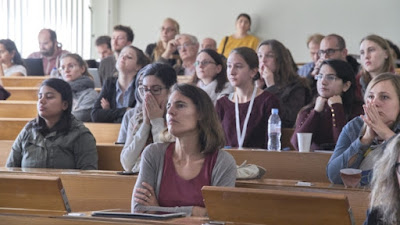 |
| Delegates at the first workshop on high-energy theory and gender held at CERN last month. (Courtesy: CERN) |
Topics: Diversity, Diversity in Science, Women in Science
More than 3000 physicists have so far signed an open statement denouncing a recent talk by theoretical physicist Alessandro Strumia of the University of Pisa. The talk was given on 28 September at an inaugural CERN workshop on high-energy theory and gender in which he claimed that men, not women, face discrimination when seeking jobs in physics. The statement, which has been signed by Nobel laureate David Gross and other prominent scientists, calls Strumia’s arguments “morally reprehensible”.
Strumia’s presentation at CERN included graphs and tables that analyses the citation records of papers written by male and female physicists. In the talk, he stated that these data show that “top authors are man, man,…man”. He also claimed that data related to academic hiring show that women with fewer citations were being hired over men with greater numbers of citations. In one slide, Strumia, who is an associate of the theory department at CERN, claims that he was passed over for a job at Italy’s National Institute for Nuclear Physics, despite having many more citations than the successful female candidate. The woman in question was in the audience at Strumia’s talk.
Preamble of The Open Statement:
We write here first to state, in the strongest possible terms, that the humanity of any person, regardless of ascribed identities such as race, ethnicity, gender identity, religion, disability, gender presentation, or sexual identity is not up for debate. Physics and science are part of the shared inheritance of all people, as much as art, music, and literature, and we should strive to ensure that everyone has a fair opportunity to become a scientist. The question of discrimination based on ascribed identity is a moral one, and we write to affirm that discrimination is not a welcome feature of our field, however pervasive it may be. It is clear that our social environment disparately affects the participation of people with ascribed identities that have been traditionally marginalized, and the fields of women’s and gender studies, science and society studies, physics education research, anthropology, sociology, philosophy, and Black studies have had much to say over the years about how this marginalization operates. The thin veneer of scientific rigor with which Strumia’s talk began was followed by open discrimination and personal attacks, which we condemn unconditionally.
Thousands of physicists sign letter condemning ‘disgraceful’ Alessandro Strumia gender talk
Michael Banks, Physics World
Comments